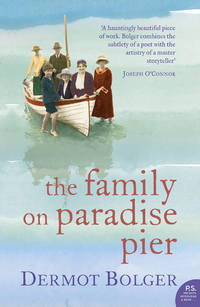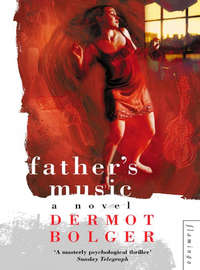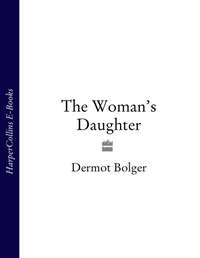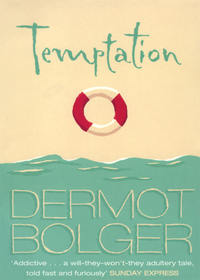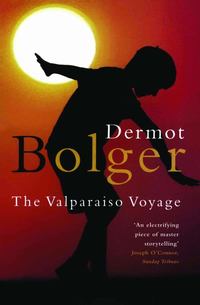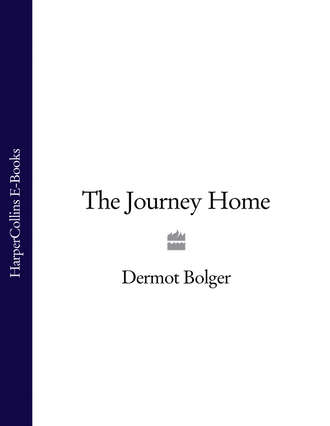
Полная версия
The Journey Home
‘Will you come home with me Hano? Will you?’
‘You know I can’t. They’ll be looking for me.’ He felt a sickness in his stomach as he spoke.
‘Not there Hano—home. They took me from it one night, half-asleep in the back of a car. Miles of darkness and then I remember waking to street lights flashing on and off like a lighthouse beacon when we’d pass under them. Thinking if I screamed loud enough I’d wake and my parents would come. And all the time my uncle’s face staring down at me, his hands stroking my hair and saying in that gruff voice of his, You’ve a new daddy now. A new daddy.
‘You know, I told myself I didn’t miss it. Drinking with the girls I’d make them laugh with stories. The soldier Ryan who slept in a concrete pipe in his field and moved his cattle into the new house the County Council gave him. Old Tomas’s tales, even the way my da…dada used to speak.’
‘But how long has it been…?’
‘Eight years.’
‘Were you ever back?’
‘No. That night with the girls in the car…but I told you, I got scared. You know, at first my uncle tried to talk to me about it but I’d put my hands over my ears and scream. One time he even decided to bring his family down to the grave and I bit his hand when he tried to get me into the car. Can’t explain it Hano, I waited for months in Dublin for them to come for me, then I blamed them, I cursed them. I was eight, Hano. I didn’t want to understand, I just wanted them back.’
Without a glance in their direction, the woman had begun to climb the steps leading from the beach. He became aware of how hungry he was. Katie was looking at him, waiting for him to speak.
‘Why not just go Katie? Why do you need me?’
‘Listen Hano, don’t you think I’ve tried? All those nights I’ve slept out, thinking at dawn I’ll go. Walking down to the carriageway and watching the trucks, waiting till one stopped and then always just standing there, unable to move. There’s an old man there Hano, he could help us.’
‘Your man Tomas? Who is he anyway?’
‘He’s just an old man, a farm labourer. He worked with dada. Two miles into the hills Hano. You’d be safe. He’d take us in.’
England was the place to go. It always had been. The enemy which gave refuge, the dull anonymity of Leeds or Bradford, the digs and building sites his father had flitted between, dreaming always of returning home. If he got away now it might be possible to gain a new identity, start again. Here it was only a matter of time, there would be nowhere to hide. Yet instinctively he knew that he wouldn’t run as he’d done all his life. He had never been bright like Shay but he could be stubborn. He remembered the farewells in Murtagh’s, no longer cardboard suitcases and cattle boats, but green cards and holiday visas. Illegal emigrants melting into the streets of American towns. As the airport posters proclaimed, they were the young Europeans, fodder now not just for factory floors but for engineering and computer posts. But once you left you were gone for ever. Shay had tried to return and failed. Hano knew it would be his last way of keeping faith, as senseless and futile as the night he’d sat beside the tramp in the hospital after the fight.
‘What if this old lad’s not there? He could be dead.’
‘Have you a better idea?’
Hano stood up and, pulling his jacket tighter, shrugged his shoulders. Anywhere was as good as nowhere and it was dangerous to stay here. She touched his shoulder.
‘Do you still hate me?’ she asked.
He shook his head.
‘I don’t even know you,’ he replied.
‘I never knew what hate was till I met you,’ she said. ‘You know, every night walking to the flat I’d pray you’d be out. I’d put my ear to the door to guess whose footsteps were coming down. Shay’s were loud and quick in his old boots; yours were a dreary tread. Every time I heard them I’d pray to God you’d fall and break your neck. You should have seen yourself, opening the door like a nightclub bouncer and mumbling, “Are you coming in or what?” Without you, I thought Shay could be mine. So don’t make me ask you for anything, Hano. But I’ll go alone this time if you won’t come.’
He put his hand hesitantly on her shoulder. She didn’t look up or pull away.
‘I can’t fill his boots, Katie. And I’ve lived in his shadow so long I don’t know what to do without him.’
She touched his hand for a moment and let it fall.
‘He’s dead, Hano, and I don’t want some sort of substitute. You stand or fall by yourself. So don’t lead or don’t follow me, but if you’re going let’s just get the fuck away from here together.’
‘You know if you’re caught with me they’ll probably charge you as well.’
She stared back at him without replying.
‘Another thing,’ he said.
‘What?’
‘Where the fuck is Leitrim?’
She smiled for the first time, then turned, and without waiting for him, began to walk towards the edge of the rocks. He looked back once at the bunker and followed her. He took her hand as they fought for footholds among the crevice pools and boulders confettied with seaweed and damp moss, but when they had climbed up to the unpaved cliff walk that mimicked the twists of the rock face he let go of it again, uncertainly.
A seal’s head bobbed below them like a lost football. A lone sea-bird stood its ground on a rock, head constantly brushing the underside of its wing. There were tentative drops of rain. In the silence the horror of the previous night returned and he felt giddy with terror. He kept trying to justify it in his mind but knew it made no sense to anyone except perhaps to her. The images came back with the clarity and detachment of a horror film that seemed to have no connection with him. His past might have happened to somebody he’d vaguely known and lost contact with. When he’d hang back as Shay plunged them into another bout of lunacy, the older lad would say, ‘One day Hano you’ll go wild and leave us all only trotting behind you in a cloud of dust.’ There was no Shay to see it, but Hano knew he had been thrust from his cocoon and could never manage to climb back. He followed the small figure with the cropped black hair along the cliff path knowing that this time was a bonus, with every second worth fighting for.
A single rusted strand of wire ran between them and a sheer drop. A stone wall with tiny flowers clinging to the crevices divided them from the fields on the far side. Before them a tall water tower rose like an upturned pint glass dwarfing the imitation round tower beside it. It had been built as a folly by a landlord in famine times but a century of weathering made it indistinguishable from the real thing. Behind it the cluster of red-bricked Victorian buildings which formed the Portrane asylum began to appear, flourished with turrets and Gothic trappings like the mansion of some cursed inbred clan. Silent as ghosts a stooped line of its patients appeared slowly around the corner ahead of them, a nurse’s white uniform blazing among the shabby greys and browns of their clothing.
When Hano and Katie reached the first couple they drew back towards the safety of their minder. The line stopped and shied away towards the wall until they had passed. The old men’s faces twitched under caps as they watched. The final old woman had a radiant girlish smile and waved back at them from a drugged stupor. Her eyes were the brightest Hano had ever seen. Beside her a bald man in his forties was turning in a constant circle with a slow and perfected step, like a child trying to be dizzy. The others simply looked old, bemused and abandoned. The nurse smiled and motioned her charges into life again. A middle-aged man was doing press-ups on the lawn in front of the hospital. It was impossible to know if he was keeping count or aware that he was being watched. He stretched face down on the grass, gravely raising and lowering his body as though determined to prove his strength or keep the flame of sanity alive in his mind. Katie shuddered and turned away from the wall.
‘Christ, I hate asylums,’ she said. ‘Always remind me of the one at home. A former workhouse it was, a rambling, rundown ruin. It wasn’t just for the sick, you know. It was a dumping ground for anyone they didn’t want, stuck out on the edge of the town. Whenever we had to pass it, I’d beg mammy to cross the road before we reached the gate. I was always scared she’d leave me there. That was her biggest threat, not dada’s strap or the bogeyman but we’ll send you off to the home.’
In Dublin Hano rarely remembered her mumbling more than a few words, and then they had always been of the streets outside. Now that she had begun to talk of Leitrim it was like she’d never stop.
‘The time the nuns in the school asked my uncle to take me to the psychologist was when I ran away first. Three nights kipping out in an old car by the Tolka. All I could think of was the spinsters locked up in that place because they couldn’t be married off and the backward kids shut away so as not to shame their families before the neighbours. I mean, I knew it wouldn’t be like that, it would be all shagging ink blobs and when d’you start using dirty words, but it was the same fear inside me.
‘There was this woman, our next neighbour after Tomas, called Mary Roche. She was twenty-five years in that home before her mother died and some relative back from England found out and signed her release papers. Mammy often brought her in because she could hardly feed herself by then. She lived on crackers, single-wrapped slices of cheese. Anything that came in plastic was good because it was what visitors had brought in for the other patients. If mammy left the kitchen she’d sit with her arms in front of her on the table for hours on end.’
‘What happened to her?’ Hano asked.
Katie shuddered, looking back down the path as if she could still see the line of patients.
‘She was only twenty when it happened. Some carpenter down from Dublin fitting out the family shop. One night her father found her bed empty and caught them in a shed at the back. The carpenter was in hospital a week before he managed to slip out. She was kept locked up. You know I think it wasn’t just what she was doing but who she was with. If it had been the doctor’s son they would have all been indignant and yet delighted. But it wasn’t, so they beat the skin off her back. Once she escaped to Dublin. Her father caught up with her after five days, famished, still in the same clothes, looking for the carpenter’s digs. Doctor O’Donnell signed the committal papers. He’d have signed over his granny’s corpse for a brandy.’
Katie leaned against the stone wall, staring at the hospital as she spoke. Hano put his hand on her shoulder. She shrugged it off.
‘The year I was born, Hano, there was a scandal in the town. No papers carried it, nobody spoke to strangers, but people knew. One evening Mary Roche told my mother. They didn’t know I was there, against the side of the dresser, hardly daring to breathe as I tried to make sense of her words. I didn’t understand them all but I understood the terror in her voice.
‘On weekend nights The Railway Hotel stayed open after hours for select customers. When the owner finally got sick of their drunken talk, Doctor O’Donnell would bring a few cronies across to the asylum—the chemist, the draper, a few big farmers with sons at college, the local councillor with his fainne. I could see them all in my mind as she listed them. They’d drag the retarded girls out of the wards to use them as whores. Can you imagine it? The stink of whiskey off their breaths and their laughter billowing down the corridor. Do you want the really funny part, Hano? The punch line? They’d bring in little boxes of Smarties for the girls. The two night nurses stayed quiet, they had jobs and families. It could have gone on for ever only some guard, fresh out of training school, reported the whole thing to his superiors and got transferred to the arse of Donegal for his trouble. The only charges were against the publican for after-hours serving. The doctor got the hint or maybe the inspector got in on the act.’
Hano stood back, afraid to touch her hunched-up shoulders. The man on the lawn had finally stopped. He lay face down, motionless.
‘When I was eight, Hano, they unveiled a statue to some poor wanker who’d been shot at eighteen by the Black-and-Tans. They’d a pipe band, a priest and altar boys, the usual old shite, the FCA strutting round with empty rifles. The organizing committee had a row of seats on a raised platform. As each of their names were called out I could hear my mother trying to hush Mary Roche as she intoned like the response to a psalm, He had me! He had me!’
Katie turned to look at him. Her voice had grown shrill and he saw tears in her eyes.
‘So why the fuck do I want to go back? To that fucking pain? Dada waiting in the square for those bastards to give him a day’s work. You know I worked beside him every evening when I finished school. I can see them still arriving in their cars to survey the lines of workers, their eyes watching me stoop in a child’s frock and a man’s rubber boots to pick potatoes from the muck. I was only eight but I remember the look in their eyes, I knew what it meant. I can still see the leers on the faces of every last bastarding one of them!’
She turned and walked quickly ahead of him, her back hunched as if part of it were broken and all the toughness gone, so that momentarily she looked like the sixteen-year-old child she was.
That first weekend with Shay it was Sunday afternoon before I got home. One event had simply folded into another. I remember lying on the mattress in Shay’s flat after Murtagh’s in the early hours of Saturday morning, the glowing tips of joints passing back and forth. He had the stereo on and the curtains undrawn so that each number was rolled in the street light filtering through the high windows. I remember the outline of his face in the bed above me, the teeth white as he laughed at some joke, the hands folded behind his head on the pillow as he waited for the joint to return. People arrived and departed from the house all night—the strains of music upstairs, the creak of a bed, a girl’s voice on the landing. I don’t recall going to sleep. I just woke next morning, my throat raw, my chest on fire from alcohol. Shay was standing beside the two-ringed cooker near the window wearing only his jeans. He lifted the first pancake on to a plate, smeared it with butter and honey and placed it on the floor beside me.
‘We need food badly,’ he said. ‘Or we’ll be rightly destroyed.’
The house was on the corner of a road in Ranelagh. Across the street a greengrocer piled his goods on to the pavement, the fruit gleaming in the sunlight as he stood in his apron to chat with passers-by. The road curved away in a mass of old trees. The pub on the corner was dark, a Lourdes for quiet men seeking the cure. Shay spread the racing pages of the paper on the table in front of us and accepted whispered advice from the two men on stools at the bar. I drank the first pint slowly, savouring its bitterness on my tongue and I thought of home, my mother in a phone box probably phoning the hospitals.
I knew that what I was doing to them was cruel but somehow it seemed necessary. Every hour away gave me a small thrill of power at making them aware of the difference within me. Maybe I was just afraid to go back and face them, but I think I was so mesmerized by Shay as to be incapable of leaving before he told me to go. I wanted to be a part of the world he moved in, feeling more alive in his presence than ever before in my life.
I’d promised myself I’d go home after the last race when we stood on the steps at Leopardstown that afternoon. Then Shay met a friend who had won a share of the tote. Out of obstinacy he’d refused to take a cheque and we waited to escort him back to town by taxi with a plastic bag full of small notes and coins. Again I swore to leave after we had a drink with him, then after we’d eaten and then on the last bus.
The party was on the far side of Rathfarnham, a girl from the office’s twenty-first. In the hallway of the house she rented with four others Shay found a bottle of whiskey and one of gin. He emptied them secretly into the basin of punch and went round with a spoon ladling it out. A bonfire blazed in the backgarden. Mick sat on a swing, a six-pack between his legs as he rocked back and forth, the glow of a roll-up sweeping in an are through the air. Figures fluttered in the semi-darkness. I collapsed into a hedge and fell asleep. Shay and Mick must have carried me inside to the living-room floor. I woke next morning stiff as a cloth left out on a line in winter, the blanket placed by Shay still over my shoulders. I found him asleep upstairs, his arm around some girl. He woke and winked, untangling himself discreetly.
Scowling, we wandered through street after street of new homes, completely lost in that new suburb at the foothills of the mountains as remote to us as our own had been to our fathers. The brickwork on each house looked too new, too consciously trying to be old, not to seem like Noddy houses. We grumbled in the clean air, among the brightly painted doors and privet hedges, speaking of the poetry of rusting steel, our favourite old factories, crooked laneways decked with glass and graffiti. Families were climbing into cars for Mass, a dog came proprietorially out to investigate and fled to the sanctuary of his porch when Shay knelt to bark at him. After an hour a bus came. An old tramp sat across from us in the back seat playing a mouth organ and banging his feet in time to the tunes. I knew I finally had to go home. I left Shay in the city centre looking for his car abandoned on Friday night and nervously got a bus. I tried to rehearse words to myself, remembering the speeches I made to my father in my mind about the old woman. Now the same phrases come back again five years on. This time I swore I’d say them.
But in the end I said little and they said less, though I could see the hurt in their eyes. My young brother told me they had gone to the police earlier that morning. I kept wanting to explain but as soon as I stepped back inside their house I knew that, like trying to talk about the old woman, it was impossible to bridge our worlds.
But this time I think my father wanted to tell me he understood. I had sensed his attitude to me change the first day I returned from work, but to my mother I was still a child. I could hear her scolding him in the kitchen for not being firmer as I lay in my room. I wanted to go down and apologize but by now it had become more than just a weekend. I was punishing them with my silence just for being what they could not help being. A mother and father I loved but no longer belonged to. It was time to enter my own world yet it seemed I couldn’t make the break without causing them pain and deliberately denigrating the memories that bound us. What had once united me with my parents now seemed ridiculous—those memories of gardens and jockeybacks. From that Sunday I was like a wound inside their house, festering without air, living only for the evenings when I could take the bus to town.
Because now it was Shay that I lived for. In the weeks that followed I didn’t just want to be with him, I wanted to become him. Sometimes it seemed I had almost succeeded. Towards closing time in a pub, if I lowered my head for a moment with his voice still in my ears, I felt physically locked inside his body, seeing through his eyes, sharing his thoughts. At work the girls slagged me for unconsciously imitating his gestures as his key words found their way into my speech. Even Mooney treated me with caution as an appendix of Shay.
Each night spent wandering through bars and parties with him made my home seem more distant. I was split in two, my personality changing each time I opened the front door, the afterglow of being with him reinforcing my isolation in that room where my parents sat trapped before a television. In their company I was sullen, closed in on myself, but once I left I could feel myself change. I would shout and embrace him when he entered the pub and he’d laugh, calming me down like a young puppy. Drink gave me courage to become all my imaginings. I hid behind it, stumbling down alleyways after him, falling, singing, hopping up to ride on his back to shout like a Horse Protestant. I became a jester unleashed, knowing only exhilaration, yet capable of being stilled and made to feel childish by one look of irritation from him.
I longed merely to be allowed to take a blanket and curl up on his floor below the huge bay window. As each evening progressed I’d grow nervy, ordering that last drink for us just a fraction too late for me to reach the bus stop on time, glancing at the pub clock, dying for him to suggest that I stop over. Sometimes he’d be chatting up a girl or just tired and wouldn’t bother and finally I’d have to face the long walk back to my parents’ house, with the night oppressive on my shoulders. But more often he would offer me a mattress and I’d casually accept, trying not to sound too excited.
The night would wind leisurely back to his flat, via kebab shops and snooker halls. Shay kept a small axe under the seat of the Triumph Herald and auctioneers’ signs and advertising hoardings on quiet corners we passed often vanished in the darkness. Back in the flat he’d chop them up, hold a match to the fire-lighters thrown beneath them, and we’d sit across from each other at the Victorian fireplace, talking over dope and tea about our pasts and our plans. Often the front door banged at two in the morning and Mick would arrive with a group of mates. I’d clear the table while Shay searched for the cards. Dealer’s choice for any poker variation; Klondikie, Southern Cross, Ace High, Blind Baseball, Seven- and Five-Card Stud, under a barrage of wisecracks while Ian Dury and Wreckless Eric revolved in the cramped space beneath the sink. If the game flagged he’d throw in a few rounds of In-Betweenies, and we’d dare each other to go for the pot, laughing when somebody lost and had to stoke it.
If dope was plentiful Shay would produce an ornate water pipe from beneath his bed. Slowly it passed along the lips of the gamblers. I’d close my eyes and lean backwards to feel the room lurch and buckle in my mind, white colours merging into brilliant shades that blazed against my eyelids. I’d open them to arguments about who should go for skins to the twenty-four-hour shop. I’d offer to go and stand blinking in the bright shop, feeling like a criminal as I asked for washing powder and sliced ham as well in an effort not to buy the cigarette papers too conspicuously. The boys would crack up when I returned, clutching the bag of shopping guiltily under my jacket. They’d break for coffee and, still slagging me, hold putting competitions on the carpet with those who were knocked out, betting on those who were left.
Some nights people brought bags of magic mushrooms which Shay fried on a pan with oil and salt despite protests from all. They took time to take effect. On the first night I had forgotten them when the colours began to explode. Shay was sleeping in bed. I lay on the mattress beside the embers of the fire like a man strapped to a galloping horse, feeling the drug like a Martian from a B-movie coming alive in my body. For two days at home I still felt them as I sat before the television with my father, frightened to speak or make a sudden move, paranoid that he would notice the twitching I imagined I had developed.
One night Mick fell asleep lying on the side of the bed. Shay took every poster and cartoon off the wall to collect the Blue-tack on the back. He rolled it into a long sausage stretching from Mick’s hands which we joined at his groin up to his mouth. We smeared the tip with mayonnaise and, carrying him gently outside, left him to wake on the front steps. That was the night Justin Plunkett came by with a slab of black from Morocco smuggled in through the diplomatic bag. He was out of place, deliberately slumming it in his expensive leather jacket among the cluster of jeans and grubby sweat-shirts. He left soon after, blown out by the lads’ indifference. On the steps outside he woke Mick.
‘Hey, my man, it’s not cool, you’ll catch cold.’


